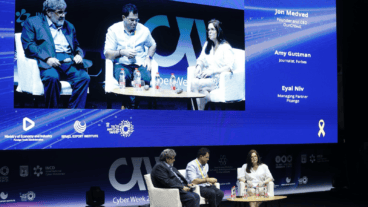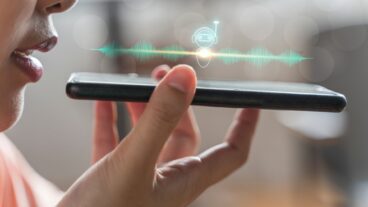The ability to monitor calls and pick out keywords isn’t just the stuff of dramatic television – it is very real, and becoming more accessible even to those who don’t work for the CIA.In television spy shows like Alias, the characters often refer to sophisticated computer programs which screen millions of phone calls and pick out key words.
As the fast-paced television plots unfold, CIA operatives are breathlessly alerted that their state-of-the-art equipment has just monitored someone using the word ‘bomb’ or ‘explosive’ in a phone call, and they head out to save the day.
The ability to monitor calls and pick out keywords isn’t just the stuff of dramatic television – it is very real, and becoming more accessible even to those who don’t work for the CIA.
Israeli company Natural Speech Communication recently announced the launch of a new product, Key Word Spotting, a speech recognition engine which can spot keywords spoken while monitoring ongoing calls. Unlike rival products, KWS can handle long, continuous conversations and many calls simultaneously.
The new product, targeted to both the security industry and commercial call centers, has an audio search engine that looks for specific words within a long spontaneous and natural conversation between two or more speakers.
The KWS engine has advanced features, such as the ability to identify sensitive keywords in security context over live calls or off-line recordings, and automation of the call monitoring process in commercial call centers so calls are flagged and brought to a supervisor?s attention when a key word is mentioned
“Our tool offers the ability to monitor hundreds or even thousands of calls at the same time,” Guy Alon, marketing director of NSC, told ISRAEL21c.
Alon said the product has great potential to improve efficiency in the thousands of companies who conduct sales and customer service by phone.
“The supervisor in a call center can program the system to alert him that one of his agents is having a problem with a customer – keywords could be programmed, like the name of a competitor, or a phrase like ‘cancel subscription’ or other words that imply that he is angry or unhappy. Once, alerted to the problematic call, he can then listen in as a silent participant in the call, or he can intervene.”
The sophisticated KWS capability allows call-center operators to gain valuable insight into what is being said in calls and by analyzing that information, they can uncover trends and quantify data, and ultimately improve quality control.
And, of course, there are numerous Alias-type uses for such a technology: the KWS engine can be integrated with recording systems or security and intelligence wiretaps.
For example, it can be set to identify words like ‘bomb,’ ‘explosive’ or ‘weapon’ for security applications or to look for specific code words.
The Israeli daily Globes reported that defense forces have been using the tool for more than a year. Israeli and global intelligence organizations are using it to locate terrorist organizations planning attacks. NSC declined comment on the matter
The KWS technology is a new direction for the company, which started as a tiny four-man operation in 1994. Today, the NSC has 27 employees, 22 of them technicians.
Until KWS was launched, the company’s single product was an adaptable, affordable speech recognition engine, the type that makes it possible to direct voice mail and complete other actions through speaking on the phone, without needing to use the touch-tone numbers.
“Training machines and computers to understand human speech, and to translate human voice into actions is an important part of automation in call centers around the world,” said Alon. “The traditional technique of ‘pressing one or pressing two’ isn’t very user-friendly. It is much better if customers can say what they want and the system can understand what they say.
For example – in operating one’s own voice mail, with a high-quality speech recognition engine in place, instead of pressing a series of keys, a customer can simply tell their machine ‘I want to hear messages from yesterday.’ The system picks up on the word ‘yesterday’ and plays only these messages.
When it is used correctly, a client could call a company switchboard and tell its automated system, ‘I want to speak to the marketing manager’ or say ‘I want to speak with Mr. Jones,’ and in either case, be connected with the right person.
“The main incentive to adopt this product is that there are operational savings for companies,” said Alon. “Call centers deal with massive numbers of interactions and the costs of paying for so many human agents and maintaining the facilities to accommodate them are tremendous. Automating the simplest, most common tasks carries a huge potential for savings and customer satisfaction.”
And even when they aren’t dealing with another human being, “customers prefer to interact with call systems in the most natural way, which is speaking, and which is more convenient using a hands free device. With the reduction of the waiting time for the average customer, quality of service, a lot of incentives to adopt this technology and the return for the project is tangible and clear,” he said.
NSC is not the only company in the world working with speech recognition, and certainly is not the largest. But Alon explains that their advantage is that they do not rely on the installation of a large hardware system.
“Our solution has much smaller footprints and easier integration and requirements to deploy it,” he said, describing their niche as bringing in speech recognition in a cost-effective and flexible way that can be integrated with existing systems.
“We believe that speech recognition technology should and will become an affordable commodity. Right now it is in a position that is very high-end, and only the rich players can afford it. In the near future, using NSC technology, it will get to the point where every small enterprise can buy our engine and plug it in.” said Alon.
This has become possible as the technology has matured. Its development began in the 1980s but the recognition rates were low.
“With today’s power and reliability, we can expect rates of above 90 percent accuracy, which can match and even surpass human agents,” said Alon, adding with a laugh, “The machines are certainly more patient.”
He notes that the company called itself NATURAL Speech Communications to emphasize that the technology is so advanced, that people using it can speak naturally.
“With NSC technology, the machines can recognize natural normal speech – you can mumble, you can speak with an accent, you can pause – you can speak the way you usually do and the system will understand you.”
He notes that you can also have fun with speech recognition technology. One deal that the company did with the Israeli cellular provider Orange offered a service where personalized songs could be sent to friends and family.
“They are asked to say the name of the recipient into the phone, and an engine plants the name into their favorite song. Without this technology, such a thing couldn’t exist.”












